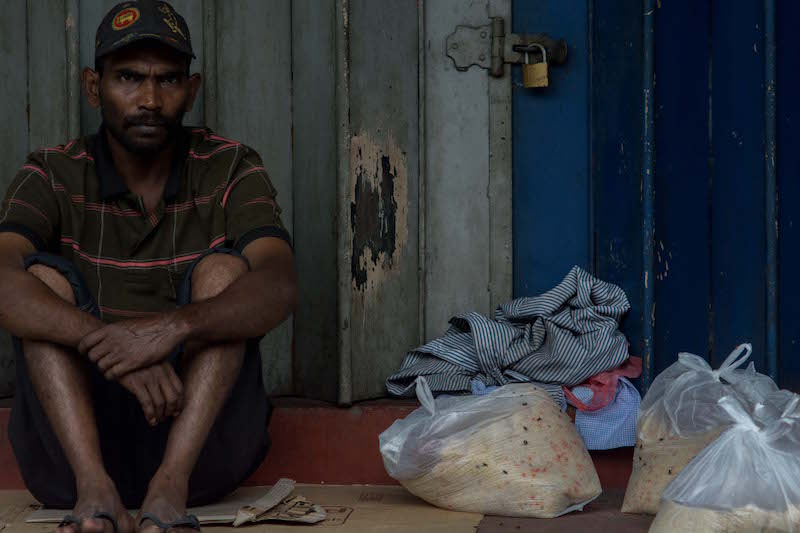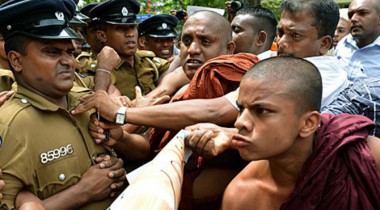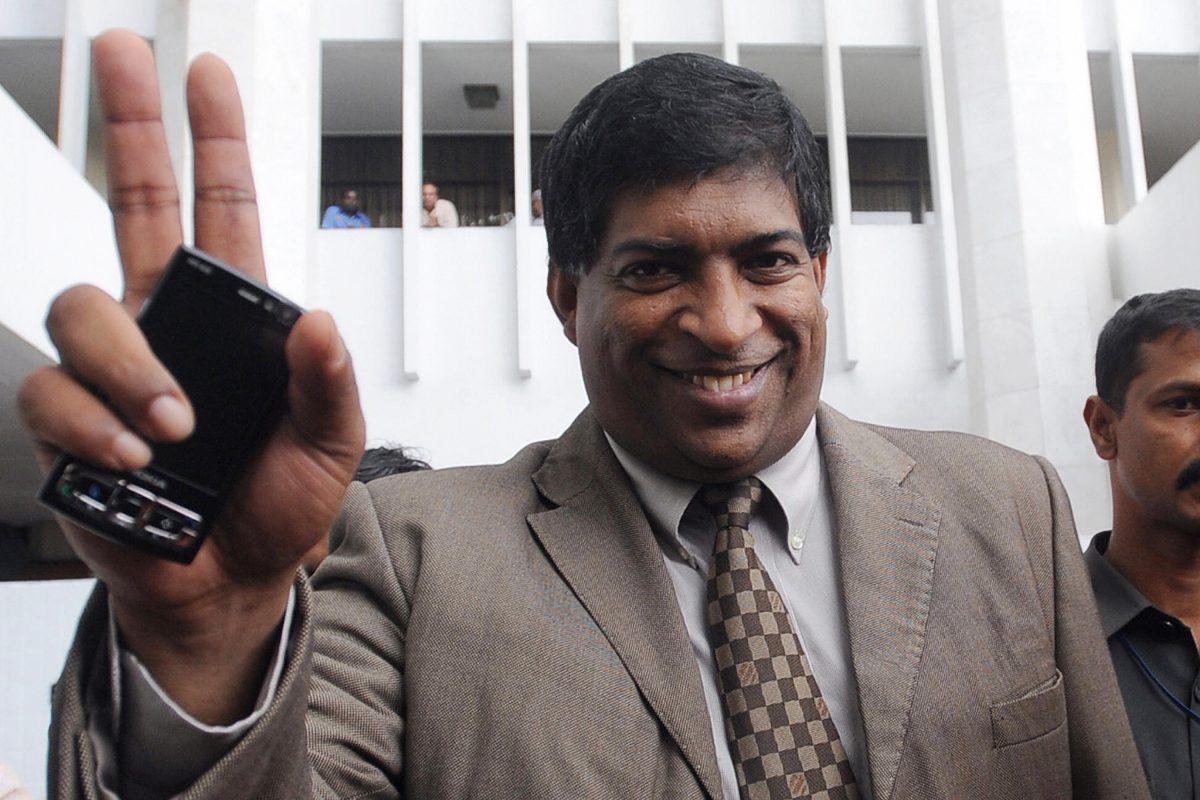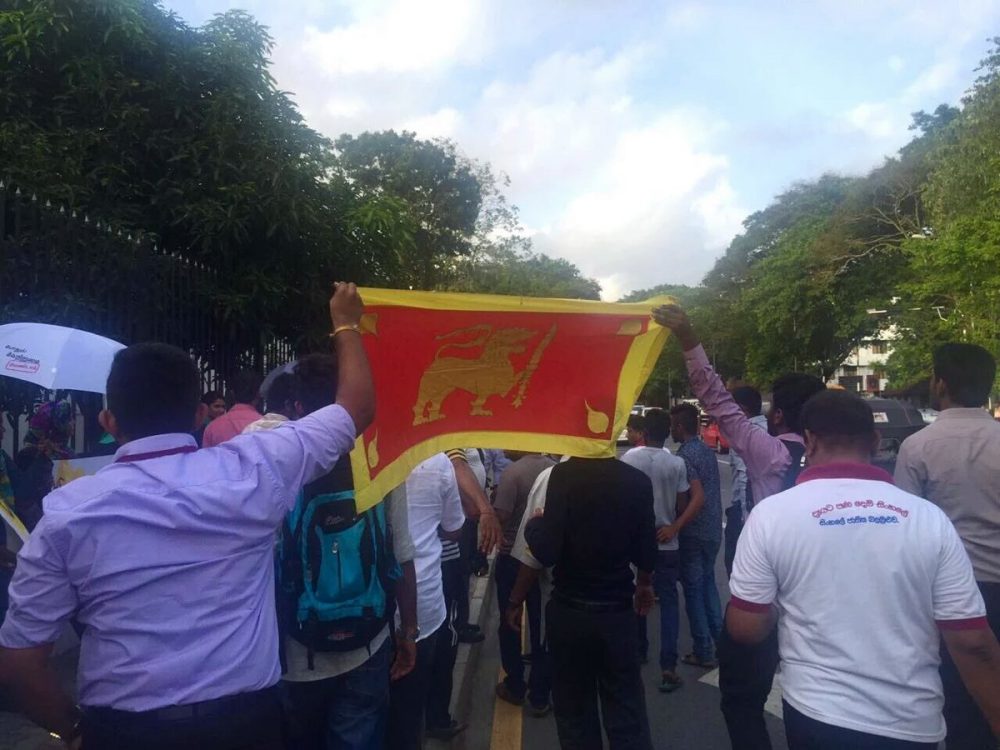
The concept itself – sexism – is far from new and can probably be dated to the agricultural age (our ancestors from hunter-gatherer tribes are said to have been more egalitarian – imagine that!). Because of its prevalence in many societies and in many forms, it’s obviously no surprise to find the prejudice transferred to the internet. Although there is no evidence that sexism has increased after the advent of the world wide web, the internet has, however, allowed for it to be viewed more publicly. From comments on Facebook pictures, to comments on articles and issues, to blog posts and memes, sexism on the internet has taken many shapes and faces, possibly encouraged by relative anonymity, lack of accountability, and the online disinhibition effect.
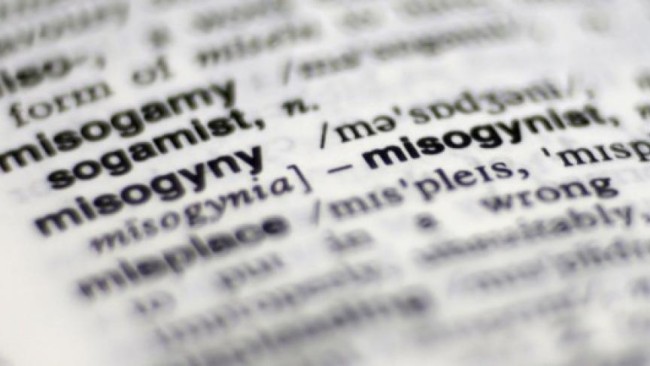
Misogyny has existed in cultures across the world, and for a long time ‒ the internet now gives it a new spin. Image Credit: REUTERS/Tim Wimborne
Sri Lanka is, quite obviously, no different – it is interesting (and appalling), for instance, to see how internalised sexism, which up to this point rarely had an audience wider than your immediate circle, has become, embedded within the emerging Sri Lankan viral culture, if you can call it that. Let’s take a look at a few “viral” events involving women that occurred over the space of a few years – from the “Wariyapola girl” to “BMW akka” to the “Danno Budunge” controversy – to understand the issue (of cyber sexism) a little better.
Based on comments made online (of which we have compiled a series of screenshots) on various platforms including Youtube and “gossip” websites, a very disturbing picture emerges of Sri Lanka’s citizens’ treatment and opinions of women. You can access all the screenshots here (although caution is advised; the content of the screenshots is extremely disturbing). Please note that the examples provided are in no way exhaustive; they are merely a sample and not representative of the entire internet. Conversely, there may be plenty more examples that haven’t yet been documented – for the purpose of clarity, we will only refer to a narrow segment of samples. We have also blurred out the last names of the people who made the comments – but because these comments are freely available on public domain and haven’t been taken from any personal pages or accounts, we have, for the most part, left them as it is.
Additionally, in the three case studies highlighted, we will not be analysing the issue itself to determine whether what took place at the scene was right or wrong. Rather, we will be studying some of the reactions to the issue as found on public online forums. Please note that the writer personally feels that gender roles and gender constructs are to a great extent outdated and need to be redefined (this applies to both men and women), and when terms such as “feminine” and “masculine” are used, they are used to indicate perceived societal norms and constructed behavioural frames.
Observation

In most cases involving women, a lot of criticism is directed at the person’s gender. Image Credit: sidedooryk.com
What these three issues have in common is that they deal with women. The comments made are, therefore, gender-centric: there has been direct allusion to the person’s gender, which may at times, take precedence over the issue itself. Such gendered comments, however, aren’t new to Sri Lanka alone. What we can understand from all these cases is that most often, if there is a woman in question, comments will be directed at her based on her gender alone.
In all three cases, the women have also been perceived by the commenters as having crossed a line.
The “Wariyapola Girl”

Right or wrong, the internet’s reaction to this video was far from pleasant. Image Credit: adaderana.lk
Looking beyond what is “right or wrong” in this case, we come to comments where the commenters were strongly angered by the incident. The general understanding gleaned from the 12 screenshots we used to study this case includes the following:
- Most of the commenters felt that the lady in question transgressed her gender boundary – a woman is supposed to act within a certain frame which is traditionally identified as being “feminine” or “womanly.”
- As she has transgressed her traditionally stipulated gender boundary, she is therefore considered immoral or loose and equated to a “prostitute” or a “s***.”
- She is also objectified and called a “baduwa” (a thing, or a trading good).
- She is likened to an animal (“b****”).
- Use of derogatory pronouns, indicating that the lady in the video holds a low place in society and doesn’t deserve respect.
- This is reinforced by the references to her non-traditional, or Western clothing, which is also perceived as “immoral.”
- In addition to being referred to as a prostitute and a sexual object, her sexual reproductive organs and physical attributes are often mentioned.
- Profanity, the use of words like “hu***,” is common.
- Added to this is the overwhelming sense of how she needs to be put in her “rightful” place because of her transgression.
- Her rightful place can be asserted through violence. This includes throwing acid on her (“acid parak”), sexually assaulting and raping her, and even killing her. Violence is punishment.
- All this is somehow tied up with a sense of nationhood and patriotism. A common gripe is that such women are “ruining our country.”
From all the comments, what we gathered was that the commenters were all male. We also understood that what a woman should be and do, how a woman should dress and behave, are governed by traditional notions. A woman who goes beyond this is perceived as being “non-traditional,” “Westernised,” even “anti-national,” and “anti-Sri Lankan.” Somehow a sense of nationhood is thrown into the noxious mix, giving the impression of a society that is highly patriarchal, rigid and traditional. This sense of nationhood can only be maintained and protected from influences (such as Westernisation) through extreme violence.
The Danno Budunge Controversy

This time around the accusations even stemmed from ideas over religion and nationhood. Image Credit: Facebook/Kishani Jayasinghe (Soprano)
In the previous case we noted how a sense of “nationhood” was often traditional and patriarchal. In this case, religion is also perceived as phallocentric. There was also a degrading statement made towards the singer on national television. The effect of such a statement when it comes to influencing public opinion isn’t quantifiable; but it can be supposed that it may have contributed in some way towards the negative sentiment. In comparison to the “Wariyapola girl” case, however, the Danno Budunge incident didn’t draw as many sexually explicit comments, but the comments are still derogatory. Here’s what we noted:
- There is a greater use of derogatory pronouns here than in the previous case (in the previous case, she was outright referred to in profanity), indicating a clear lack of respect and allocating the woman a low place in society.
- Likening to an animal (“b****”, “ele dena”) and the song to animal noises, once more reinstates her low status in society and even implies something inhuman and possibly unpleasant (to clarify: we at Roar don’t think animals are lowly or unpleasant; on the contrary, we love them, hence the focus on environmental and wildlife in our articles. The general tone used in the comments implies a derogatory attitude and give the impression of the song being unpleasant or even sub-human by alluding to animal calls).
- The references to sex and sexual organs are less than with the “Wariyapola girl” case, but here, because the singer is a professional, there was a reference to her using her sexual attractions to get ahead in life, implying that her talent alone couldn’t have accounted for her successful career.
- She is referred to as a “prostitute” and a “s***,” and thereby called immoral and loose.
- Plenty of profanity, indicative of disrespect
- She is also referred to by certain terms, which in Sinhalese, imply being an unpleasant and wretched woman.
- Not only is the singer referred to in derogatory terms, oaths are also made on her mother (never the father!)
- Accusations of endorsing Western practices and by polarising the argument, implying disrespect for what is local and homegrown, and therefore, in some way, anti-national and anti-Sri Lankan.
- This is linked to what many commenters refer to as “ruining the religion and race.”
- All this is somehow linked to the new regime, bringing in a political dimension to the fear of Westernisation and fear of weakened religious and traditional values.
- Finally, violence is endorsed, but in this case, divine justice by calling upon lightning to strike her, a form of celestial revenge on her transgression.
The Danno Budunge case brought up a lot of anger, particularly because many perceived it to be disrespectful towards religion. There were negative comments made by women, but the comments that were profane and derogatory were made entirely by male commenters. The Danno Budunge case also brought in a political dimension. Commenters implied that the singer was able to perform an act which is disrespectful towards religion because of the new regime; the new regime, therefore, endorses the weakening of traditional institutions such as religion. Added to this is the fear of Westernisation and the implication that traditional values are deteriorating (hence a woman is able to openly and publicly “disrespect” religion), leading to a morally loose society. With the perceived weakening of traditional mores comes the vehemence of the male commenters, for the shift in values undermines and threatens the males’ traditional place in society (i.e. right on top).
The “BMW Akka”
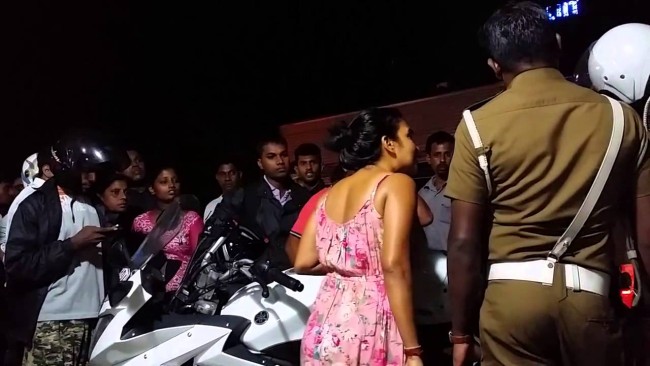
When the subject of a video this infamous is a woman, she is often subjected to derogatory remarks based entirely on her gender. Image Credit: Youtube/THILANGR8
Because BMWs are synonymous with wealth, this case has the added degree of classism to it, in addition to a political slant. In addition, we have a first: a female commenter (or so we assume, going by the comment) who engaged in making a derogatory remark on the incident. Here’s what we observed:
- The usual motley of derogatory words was used. Our single apparently female commenter used the word “b****” to describe her.
- Once more, the lady in the video was called a prostitute, thereby implying loose morals.
- In this case, although the commenters agreed she was wealthy, she was still called a prostitute, implying that her wealth did not bar her from immoral activities.
- Following the general trend, she is likened to an animal.
- There is a constant reference to female reproductive organs, often in slang, adding to the crudity of the statements.
- Many references are made to her “mouth” (kata). Commenters are unanimously angered at the fact that she is confronting the police in raised tones, bringing home the fact that she is transgressing traditional gender roles.
- Once more, there is a reference to the mother of the woman in the video, who apparently ought to be punished for giving birth to her.
- Sympathy is expressed for her husband for having to endure a woman who is so outspoken and vociferous.
- As she drives a BMW, power, wealth and class factor in the comments. Her wealth is a sign that she has partaken in illicit and illegal activities (“kudu salli”). She is perceived as a representative of a high class, immoral and dishonest elite who think money can buy them out of situations. She is faulted for coming from Colombo and thereby endorsing elitism.
- This is further reinforced by the question of “class.” There is a sense among the commenters that despite having wealth, she lacks a degree of class, which gives to the understanding that the wealth is new and ill-gotten, and is used to abuse the system.
- There is, once more, a political dimension to this, which implies that the current regime allows for the wealthy to take the law in their lands, leading to a weakening of state institutions like the Police. She is also accused of being a politician’s mistress.
- To rectify this kind of behaviour, the commenters feel that she needs to be shown her place through rape or penetration. Her behaviour is explained off as a result of being sexually loose (“dildo up her a**”) and so she needs to be punished by being raped, sexually and violently violated. Commenters have also implied that as she is a sexual object dealing with the trade of her body, it should be used against her as a form of punishment.
What sets this case apart from the others is the presence of a female commenter. Her comment is a generalised statement which implies that the lady in the video has, in some way, brought shame to other women through her actions. The takeaway from this is that there are certain “values” so deeply ingrained that it goes beyond gender: the woman commenter seems to be endorsing the same kind of disrespect the male commenters have shown. It also shows that she, too, believes that there is a particular way a woman ought to behave and has internalised the patriarchal mould; if any woman crosses this, then she has brought shame to all of womankind.
General comments
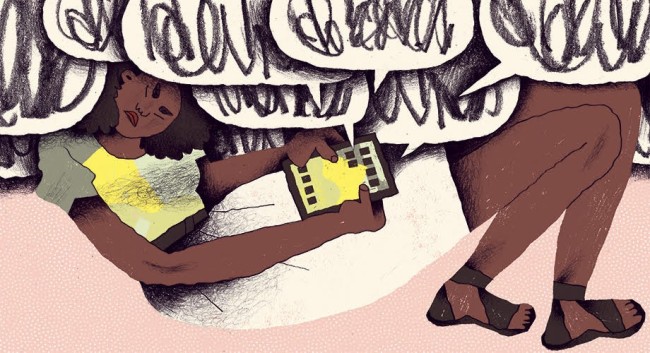
Apart from outright insults and vulgarity, online comments subject women to a barrage of opinions stemming from patriarchal ideology. Image Credit: shamelessmag.com/Kelsey Borch
All three cases are unique, and at the same time similar. The heart of the similarity lies in the fact that some commenters feel very strongly about how a woman should behave: if she doesn’t conform to their standards, they feel that they have the right to degrade her. The degradation is often of a sexual kind; reinforcing the dichotomy between genders and using sexual prowess to assert dominance over the other. In tandem with sexual degradation comes the strong idea of punishment – justice can only be asserted if these women are punished, and punished in a painful, degrading, and inhuman manner. Punished by defiling the very biological receptacles that make them women. This reduces the worth of a woman to that of a sexual object who can be brought in line through violent sex acts and rape, making her almost slavish.
What’s disturbing is the degree of violence with which this is asserted – violent acts such as rape aren’t perceived to be crimes but are considered agents of justice, a dominance of the masculine over the feminine. This degree of masculinity seems to be prevalent in many social strata: politics, patriotism, religion and tradition.
Furthermore, the commenters thought it important to mention the mothers: mothers (and mothers alone, in these cases) are responsible for the upbringing of the children, which is part of their domestic responsibility (the fathers aren’t anywhere in the equation). These type of comments reinstate a very traditional notion of a woman’s role in society and confine her to a domestic realm – overstepping this, by driving a BMW and arguing with the police, by slapping a man who was harassing her in public, by publicly using a supposedly exclusive Western form of music to sing a song many consider to be religious, is sacrilegious. All these acts, and the viral culture that helped bring them to popular limelight, have brought notice to these women who have gone beyond their “rightful domestic spheres,” beyond the private into the public domain. One can ask the rhetorical question as to why these videos have garnered such a widespread response: is it the nature of incident or is it because there are women in the video, or is it both?
Online sexism in comments may very well be symptomatic of the online disinhibitive effect, which, to quote a New Yorker article is a theory that claims that “the moment you shed your identity the usual constraints on your behavior go, too.” Such comments are in no way acceptable socially – and yet you find them, given impetus by the anonymity granted by the internet, empowering people to make statements that would, if said in a public sphere where they can be held accountable, bring censure, if only because of the derogatory language used.
We’d also like to add, to wrap up, that this isn’t a generalisation of all males – this is just a small sample from three disparate incidents and is, we hope, in no way reflective of the overall state of the country.
As is evident, when in a South Asian context, the issue of sexism is rather complex; it is multidimensional and needs more than a surface reading for better understanding. What can be gathered from this is that the internet culture isn’t very woman friendly, and may well reflect on the mindset of the users and their views and opinions of women, making the internet a darker place than usual for women.
Cover Image credit: prezi.com

